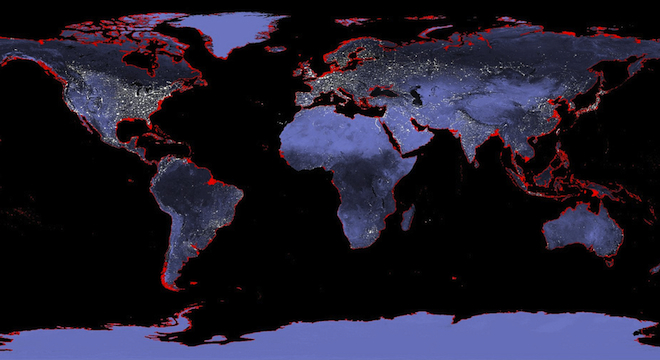The global sea level is rising 60 percent faster than previous reports issued by the United Nations Intergovernmental Panel on Climate Change (IPCC), according to a new analysis of actual observed sea-level rise data recorded, performed by researchers in the U.S. (Maine), Germany and France.
Specifically, the new study, published late Tuesday in the journal Environmental Research Letters and online at IOP Science, finds that while “global temperature continues to increase in good agreement with the best estimates of the IPCC…The rate of sea-level rise of the past few decades, on the other hand, is greater than projected by the IPCC models.”
The sea level rose by a little over 6 centimeters between 1990 and 2010, compared to the about 4 centimeter rise projected in some IPCC reports. The difference between the projected (blue and green) and actual sea level rise (red) is illustrated in the following graph included in the new paper:

Overall, sea level appears to be rising at an average rate of 3.2 millimeters a year, compared to the 2 millimeters projected by the IPCC. That could put the following coastal metropolii at risk, according to a graphic from the AFP: New York, Miami, Shanghai, Bangkok, Tokyo, Lagos, Mumbai and Jakarta, among others.
The lead author of the new paper, Stefan Rahmstorf of the Potsdam Institute for Climate Impact Research in Germany, has also authored articles describing the vulnerability of coastal cities and critiquing journalists and media outlets for failing to accurately and compellingly report on climate change findings.
Correction: The overall sea level appears to be rising at an average rate of 3.2 millimeters a year, compared to the 2 millimeters projected by the IPCC, not 3 millimeters and 2.3 millimeters as this article originally stated. This post has been updated and we regret the error.






